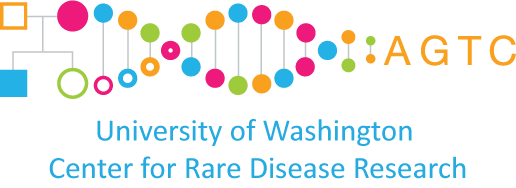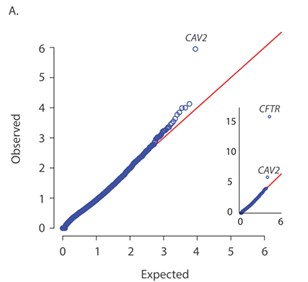
Header
About the Bamshad Lab
The Bamshad lab is committed to advancing human genomics through the use of cutting-edge technologies and translating these advancements into precision care. Much of our current work is focused on developing strategies to discover genes underlying rare conditions, streamlining the genetic testing process to facilitate diagnosis, and empowering families to leverage their genetic information to make decisions about their healthcare.
Header
Michael Bamshad, MD

Mike Bamshad's research is focused on understanding the impact of population structure and natural selection on human genetic variation, developing innovative ways to discover genetic variants underlying monogenic disorders and complex traits, and testing novel ways to translate genomic advances into practice to advance implementation of precision genetic medicine. His research has been funded for more than 25 years.
He has contributed to the discovery of hundreds of genes for Mendelian conditions, understanding the relationship between genetic ancestry and notions of race, and developed innovative ways to share data (i.e., MyGene2) and manage return of genetic testing results (i.e., My46) from exome and whole genome sequencing in both research and clinical settings. He co-authors a popular textbook entitled Medical Genetics and has recently been appointed as the Editor-in-Chief of Human Genetics and Genomics Advances.
Current Projects

University of Washington Center for Rare Disease Research
Dr. Bamshad is a Principal Investigator of the University of Washington Center for Rare Disease Research (UW-CRDR), one of five GREGoR (Genomics Research to Elucidate the Genetics of Rare diseases) consortium sites. Along with partner research centers, the UW-CRDR leverages state-of-the-art technologies and innovative analysis methods to uncover new genomic insights.

Repository for Mendelian Disorders
The Repository for Mendelian Disorders (RMD) effort aims to build a biobank that will act as an international resource for scientists to conduct collaborative research. The biobank consists of biological specimens and health information collected from participants with rare conditions. In addition to acting as a resource that facilitates research globally, the RMD helps families find a genetic diagnosis through the discovery of new relationships between genes and health conditions.

SeqFirst
The SeqFirst project is an ongoing study exploring the use of comprehensive genomic testing technologies in the care of critically ill newborns (SeqFirst-neo) and children with developmental differences (SeqFirst-DDi). The goals of SeqFirst are to streamline the genetic testing process to give more families a chance to receive a precise genetic diagnosis and investigate the effects of comprehensive genomic testing on healthcare outcomes.

Genetic Analysis of Limb Malformation
We are investigating the genetic basis of a group of syndromes collectively called the distal arthrogryposes (DAs) and to date, we’ve discovered more than 15 genes underlying contracture disorders. The data generated by this project will provide opportunities to make new insights into muscle function, directly study the causes of congenital contractures through various models, and consider new therapeutic interventions.

Cystic Fibrosis
Our Cystic Fibrosis (CF) project aims to identify genetic factors which influence susceptibility for specific respiratory infections, discover genetic variants that are associated with lung function measures, and investigate genetic
variants that impact the disease course in individuals with CF.

Genetic Analysis of Heart Defects
The National Birth Defects Prevention Study (NBDPS) is one of the largest case-control studies on the causes of
birth defects. As part of the NBDPS, the Bamshad lab is investigating genetic contributions to the development of heart defects.
Header
Currently Enrolling Research Projects

Header
Ongoing Collaborations
MyGene2 Project - Chong Lab (University of Washington)

MyGene2 is a free, publicly searchable web-based platform that facilitates open data sharing between families, clinicians, and researchers to further knowledge about rare genetic conditions. Users interested in the same condition or gene can match with one another, creating opportunities for collaborative research and for community support. Learn more about MyGene2, and get started with your own account.
Header
Services
Center for Clinical Genomics (CCG)
The Bamshad Lab manages and operates the Center for Clinical Genomics (CCG) housed at UW. The CCG provides study design consultations and laboratory services at-cost for investigators within UW and external clients. Visit our CCG website to browse our current list of services or contact us for a project quote.
Header
Key Publications
University of Washington Center for Rare Disease Research (UW-CRDR)
- The Genetic Basis of Mendelian Phenotypes: Discoveries, Challenges, and Opportunities.
- GREGoR: Accelerating Genomics for Rare Diseases
SeqFirst
Genetic analysis of limb malformation disorders
- Variants in ACTC1 underlie distal arthrogryposis accompanied by congenital heart defects.
- Mutations in MYLPF Cause a Novel Segmental Amyoplasia that Manifests as Distal Arthrogryposis.
- Spectrum of mutations that cause distal arthrogryposis types 1 and 2B.
Cystic fibrosis
- Complete CFTR gene sequencing in 5,058 individuals with cystic fibrosis informs variant-specific treatment.
- CHP2 Modifies Chronic Pseudomonas aeruginosa Airway Infection Risk in Cystic Fibrosis.
- Exome Sequencing of Phenotypic Extremes Identifies CAV2 and TMC6 as Interacting Modifiers of Chronic Pseudomonas aeruginosa Infection in Cystic Fibrosis.
- Exome sequencing of extreme phenotypes identifies DCTN4 as a modifier of chronic Pseudomonas aeruginosa infection in cystic fibrosis
Genetic analysis of heart defects

Contact Information
Research Lab Manager
Kati Buckingham
katib@uw.edu
Research Coordinator
bamshadrcs@uw.edu
Bamshad Lab, Dept. of Pediatrics
University of Washington
1959 NE Pacific St, HSB I607E
Box 357371
Seattle, WA 98195







